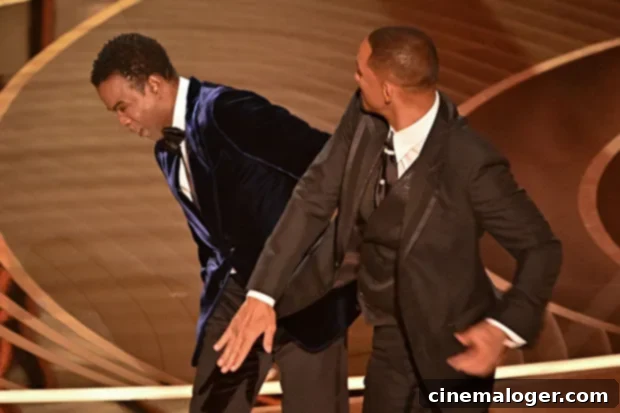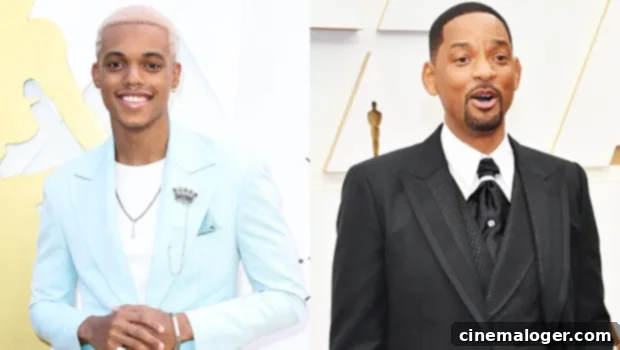Jabari Banks Reflects on Will Smith-Chris Rock Oscars Slap: A Complex Stance on Loyalty and Violence
The infamous “slap heard around the world” at the 94th Academy Awards continues to resonate in Hollywood and beyond, sparking endless debates about defense, decorum, and consequences. In an exclusive interview with HollywoodLife at The 4th Annual Griot Gala Oscars After Party, `Bel-Air` star Jabari Banks offered a nuanced perspective on the shocking moment when Will Smith confronted Chris Rock onstage. Banks, who portrays a reimagined Will in the critically acclaimed `Fresh Prince of Bel-Air` reboot, revealed his “mixed feelings” about the incident, acknowledging the deep-seated motivations behind Smith’s actions while simultaneously condemning violence.
Jabari Banks candidly shared his conflicted emotions, articulating a viewpoint that reflects much of the public’s divided opinion. The young actor found himself grappling with the dual nature of the event: a public act of aggression against a comedian, and a husband’s fierce defense of his wife. This deeply personal and widely scrutinized event saw Will Smith strike Chris Rock after the comedian made a joke about Jada Pinkett Smith’s shaved head, a result of her struggle with alopecia. Banks’ thoughtful commentary provides a fresh lens on an incident that momentarily overshadowed one of Hollywood’s most prestigious nights, highlighting the complex intersection of personal loyalty, public image, and the entertainment industry’s often unspoken rules.
During the interview, Jabari, whose own role as Will in `Bel-Air` often explores themes of identity, responsibility, and navigating complex social dynamics, delved into the core of Will Smith’s actions. He specifically referenced Smith’s marital vows and the inherent promise to protect one’s spouse. “I have mixed feelings about it,” Banks told HollywoodLife. “The number one rule in Hollywood is that women and children you stay clear of. He took a vow and that was to stand up for his Jada and that is what he did.” This sentiment underscores a traditional understanding of marital fidelity and protection, suggesting that from Smith’s perspective, he was simply upholding a fundamental commitment. “For better or for worse, he stood up for Jada,” Banks concluded, pointing to the unwavering loyalty that he believed fueled the spontaneous act, regardless of its controversial outcome.

Despite understanding the protective impulse, Jabari Banks was unequivocal in his condemnation of the physical act itself. He emphasized the crucial message that violence is never an appropriate solution, especially for a global audience, including children, who witnessed the event unfold live. “Violence is never the answer for anything and for all the kids in the world I encourage them not to do something like that. You can get into a lot of trouble,” he stressed. Banks’ words serve as a crucial cautionary tale, acknowledging the emotional trigger while firmly steering clear of endorsing aggression. However, he also attempted to contextualize the deep emotional root of Smith’s reaction, suggesting it stemmed from a powerful, almost primal, instinct. “As far as where it came from, it came from a Godly place. He is like that is my wife,” Banks added, attempting to explain the profound emotional connection that, in his view, momentarily overrode rational judgment.
The incident itself became one of the most unexpected and widely discussed moments in Academy Awards history. Chris Rock, presenting the award for Best Documentary Feature, made a G.I. Jane joke referring to Jada Pinkett Smith’s shaved head. While Will Smith initially appeared to laugh, his demeanor quickly changed upon seeing Jada’s visible discomfort and eye-roll. He then walked onto the stage, slapped Rock across the face, and returned to his seat, shouting, “Keep my wife’s name out of your f***ing mouth!” The immediate aftermath saw a stunned audience and a visibly shaken Rock attempting to regain composure and continue the show. The raw, unscripted nature of the event shocked viewers worldwide, quickly becoming a defining moment of the ceremony and sparking an immediate flurry of social media reactions and news reports.
Just minutes after the shocking altercation, Will Smith was awarded the Best Actor Oscar for his powerful portrayal of Richard Williams in `King Richard`. His acceptance speech became another focal point of the night, as he delivered a tearful address that touched upon the complexities of protecting loved ones and the demands of his role. “I want to apologize to the academy, I want to apologize to all my fellow nominees,” Smith stated, though notably, he did not initially apologize to Chris Rock. He also drew parallels between his actions and his character in the film. “Art imitates life. I look like the crazy father just like they said about Richard Williams. Love will make you do crazy things,” he tearfully expressed, hinting at the emotional intensity that led to his controversial actions. His words underscored the profound pressure and responsibility he felt, linking his public outburst to a narrative of fierce parental and spousal protection.
In the aftermath, the other party involved, Chris Rock, handled the situation with remarkable composure. Despite the unprovoked assault, Rock demonstrated significant professionalism by not escalating the situation further on stage. Crucially, he also declined to file a police report or press charges against Will Smith for the incident. This decision was a significant factor in how the immediate legal repercussions unfolded, allowing the focus to shift from criminal proceedings to Hollywood’s internal disciplinary actions. Rock’s silence and refusal to pursue legal action were largely interpreted as a move to de-escalate the conflict and maintain his dignity in a deeply humiliating public situation, though he has since subtly referenced the event in his comedy tours.

The incident ignited a fervent debate among celebrities and the public, with opinions sharply divided on whether Will Smith’s actions were justified. Many prominent figures came forward to express their support for Smith, often citing the emotional toll of Jada Pinkett Smith’s alopecia and the perceived disrespect of Chris Rock’s joke. Celebrities like Nicki Minaj and 50 Cent sided with the `I Am Legend` actor, emphasizing the personal nature of the insult. Nicki Minaj, for instance, spoke openly about having witnessed Jada’s struggle with alopecia firsthand, stating that Will was “seeing her pain” and acting out of a raw, protective instinct for his wife’s dignity. This perspective highlighted the idea that the joke crossed a line from playful banter to a deeply personal attack, thus justifying Smith’s emotional response, albeit a violent one.
However, an equally vocal contingent of stars condemned Smith’s actions, viewing them as an unacceptable act of violence that overshadowed the entire ceremony and set a dangerous precedent. Critics argued that regardless of the provocation, physical assault is never warranted, especially on such a public stage. `The View` host Sunny Hostin was among those who felt that Smith was entirely “out of line,” stating directly that he should apologize to Chris Rock. Other voices in Hollywood and beyond pointed to the implications for stand-up comedy, raising concerns about censorship and the safety of performers. The debate also touched on themes of toxic masculinity, the responsibility of male partners, and the appropriateness of public displays of anger, demonstrating the incident’s far-reaching cultural impact.
The “slap” quickly evolved into a broader cultural conversation, delving into fundamental questions about humor, respect, violence, and accountability. It sparked discussions about the boundaries of comedy, particularly when it touches on personal medical conditions, and the extent to which one should defend a loved one, especially through physical means. This incident also forced Hollywood to reckon with its own standards of conduct and the responsibility that comes with global fame. The Academy of Motion Picture Arts and Sciences, after much deliberation and public pressure, condemned Smith’s actions and eventually banned him from attending the Oscars and other Academy events for 10 years, following his resignation from the Academy. This unprecedented move underscored the severity with which the industry viewed the event and its potential long-term repercussions.
The long-term consequences of the Oscars slap have significantly impacted Will Smith’s career and public perception. While he won an Oscar that night, the controversy overshadowed his achievement and led to a temporary pause in several of his professional projects. The incident served as a stark reminder of the intense scrutiny celebrities face and how quickly public opinion can shift. Yet, the event remains a complex topic, with many still grappling with its moral and ethical dimensions. Jabari Banks’ thoughtful reflections encapsulate this ongoing struggle, highlighting the conflicting emotions that many hold. His perspective, balanced between understanding the protective impulse and rejecting violence, mirrors the multifaceted nature of an event that will undoubtedly remain a significant, albeit unfortunate, chapter in Hollywood history.
